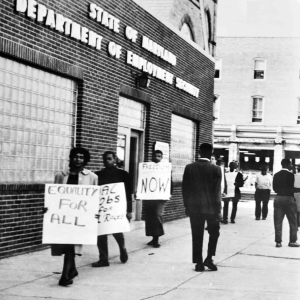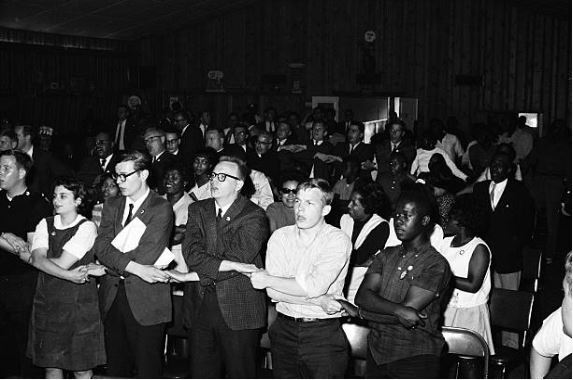
588
Downloads
7
Episodes
The podcast was created by Dion D. Banks and Kisha Petticolas, Cofounders of the Eastern Shore Network for Change. This collection of interviews was recorded and produced by ESNC board member Verlisha Taylor as a part of an event called “Reflections on Pine,” a series of events held in July 2017 to commemorate the civil unrest in Cambridge, Maryland, during the “Long Hot Summer of 1967”. These interviews focus on Cambridge during a time that, for many people, had been ignored. The first six episodes feature stories from Clarabell Tilghman, Barbara Pinder, William “Pee Wee” Jackson, Gloria Richardson, Fred Jackson, and Mayor Victoria Jackson-Stanley.“We will continue to challenge the perceptions of our community by reclaiming our narrative and sharing our truth. Our story of hope, faith, and change; a story of world-class leadership and a resilient community who decided not to accept the status quo as an option,” said Banks. “We are very proud of these first six episodes and hope more people will decide to share their stories with us. We encourage you to listen and connect with our interviewees as they share first-hand life experiences during civil unrest,” said Petticolas. ESNC’s mission is to raise awareness of issues in Dorchester County and creatively work with the community to inform, educate, and foster change, leading to social and economic empowerment. For more information about the organization, visit our website, http://www.esnccambridgemd.com.
The podcast was created by Dion D. Banks and Kisha Petticolas, Cofounders of the Eastern Shore Network for Change. This collection of interviews was recorded and produced by ESNC board member Verlisha Taylor as a part of an event called “Reflections on Pine,” a series of events held in July 2017 to commemorate the civil unrest in Cambridge, Maryland, during the “Long Hot Summer of 1967”. These interviews focus on Cambridge during a time that, for many people, had been ignored. The first six episodes feature stories from Clarabell Tilghman, Barbara Pinder, William “Pee Wee” Jackson, Gloria Richardson, Fred Jackson, and Mayor Victoria Jackson-Stanley.“We will continue to challenge the perceptions of our community by reclaiming our narrative and sharing our truth. Our story of hope, faith, and change; a story of world-class leadership and a resilient community who decided not to accept the status quo as an option,” said Banks. “We are very proud of these first six episodes and hope more people will decide to share their stories with us. We encourage you to listen and connect with our interviewees as they share first-hand life experiences during civil unrest,” said Petticolas. ESNC’s mission is to raise awareness of issues in Dorchester County and creatively work with the community to inform, educate, and foster change, leading to social and economic empowerment. For more information about the organization, visit our website, http://www.esnccambridgemd.com.
Episodes

Sunday Sep 30, 2018
Breaking the Mold
Sunday Sep 30, 2018
Sunday Sep 30, 2018
In this episode entitled “Breaking the Mold”, we sat down with Barbara Pinder, a life long resident of Cambridge, Maryland. Ms. Pinder shares with us her experiences on the front line during the time of civil unrest. She gives us insight into the struggles of securing employment during the early times of desegregation.
Even with the passing of the Civil Rights Act of 1964, in the town of Cambridge, Maryland, the fight for racial equality was far from over. The fight for civil liberties became intense due to a lack of jobs, poor housing, and racial tension.
We invite you to listen as Barbara Pinder shares how she refused to give in to discrimination and not to accept the status quo.

5 years ago
This testimony is so relatable. Thank you!